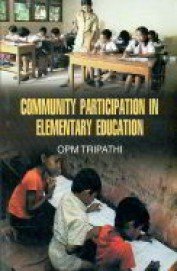
Universal Elementary Education is now both a constitutional and legal mandate. It has been declared a Fundamental Right; a law has been enacted to concretize the right to education upto a period of eight years. The Central Government is in the process of working out modalities by which it will be operationalized on the ground in States and Union Territories.
The geographic regions are diverse-tribal, rural, urban, hill areas, and coastal areas. There is also a social divide; social biases have been in operation to deny education to certain caste groups. The economic divide should not stand in the way now that the State will bear all the costs.
Community participation has been viewed as a very meaningful strategy to achieve universal elementary education. The book discusses various forms of community participation, roles of community participation, and resources that the community brings to support education of its children.
Community participation has been highly beneficial to increases in enrollment; it is believed that both through oversight and through active contribution, it can also bring about a change in the process of retention and achievement. The community will require substantial improvements in its own capacity to contribute to school’s efficiency.
ABOUT AUTHOR
Dr. O.P.M. Tripathi, completed his M.Sc. (Physics) in 1977, M.Ed. in 1979 and Ph.D. in 1999 from the University of Gorakhpur. He has been associated with the University Adult Education programme since its inception in 1980. He is continuing as In- charge Director of the Department of Adult, Continuing and Extension Education since January 1990, now he is the Coordinator of Department. He has been actively participating in various regional/ national/international seminars on the subject of Adult Education, Continuing Education and Extension.
He is credited with introducing vocational training courses like Information Technology, and, Fashion Designing under the Continuing Education Programme of the Deen Dayal Upadhyaya Gorakhpur University.
He has been decorated with three awards for his work in the areas of training of various categories of key functionaries, and strengthening the Adult Education and Continuing Education programmes. He has so far received the UNESCO National Literacy Mission Award in 2002, for outstanding contribution to Adult and Continuing Education, Sardar Patel National Award for Litracy in 2004, and the VIJAYSHREE Award for meritorious services, outstanding performance and remarkable role in 2005.
He has two more books to his credit-Relevance of Adult Education, published in 2008 and Population Ageing and Lifelong Learning, published in 2012. He has also published ten research papers in various research Journals in the field of Adult and Continuing Education.

 The Constitution of India enunciated national commitment to provide free and compulsory education for a period of eight years to all children up to the age of 14 years; the period of eight years of education was subsumed under the label of “Elementary Education”. The task was gigantic; for many years, India toyed with the idea of scaling down the commitment to Universal Primary Education thus reducing the period from eight to five years hoping that it was achievable in the first stage.
The Constitution of India enunciated national commitment to provide free and compulsory education for a period of eight years to all children up to the age of 14 years; the period of eight years of education was subsumed under the label of “Elementary Education”. The task was gigantic; for many years, India toyed with the idea of scaling down the commitment to Universal Primary Education thus reducing the period from eight to five years hoping that it was achievable in the first stage.